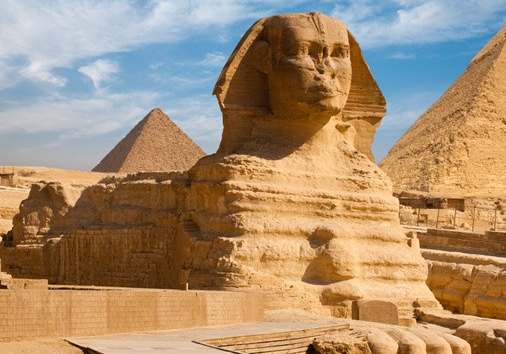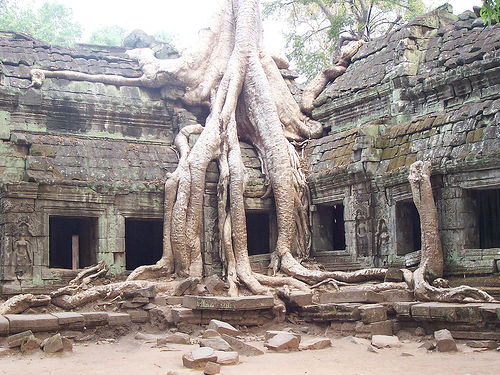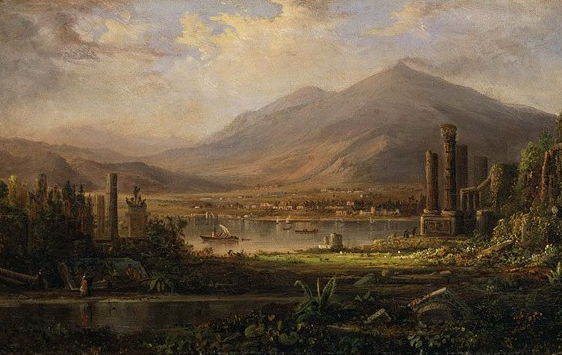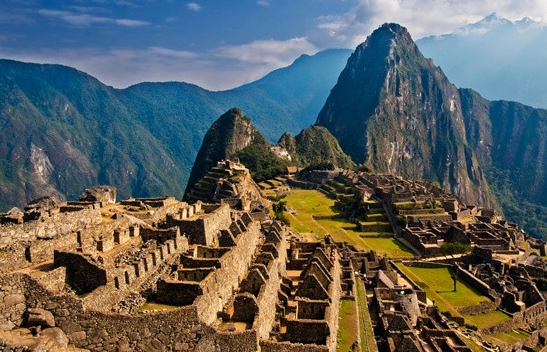(单词翻译:单击)
5.Memphis
5.孟菲斯
Founded in 3,100 B.C., Memphis was the capital of ancient Egypt, and served as the civilization's administrative center for hundreds of years before being abandoned with the rise of Thebes and Alexandria. At its height, Memphis is estimated to have had a population of more than 30,000, which would have made it the biggest city of antiquity. Over the years, the location of Memphis became lost, and it was a subject of much debate among archeologists before it was rediscovered by a Napoleonic expedition in the late 1700s, and it was then that the city's sphinx, statues and temples were first seriously studied. Unfortunately, stones from the ruins had been appropriated to build nearby settlements, and many important parts of the site remain lost to historians.
建于公元前3100年,孟菲斯是古埃及的首都,在随着底比斯和亚历山大的崛起而被荒废之前作为这个文明的行政中心长达数百年。在鼎盛时期,孟菲斯据估计有超过3万人口,可说是古代最大的城市。多年以来,孟菲斯的位置已经失传,考古学家们围绕这个话题有过许多争论,直到18世纪晚期它被一只拿破仑的远征队重新发现,那以后城市的狮身人面像、雕像和庙宇才第一次被认真地研究。不幸的是,遗迹的石头已经被用来修筑附近的设施,历史学家们还缺少遗迹的许多重要部分。

4.Angkor
4.吴哥

The Angkor region of Cambodia served as the center of power for the Khmer Empire from 800 AD well into the 1400s. The region was abandoned after a slow decline that ended with an invasion by a Thai army in 1431, leaving the massive city and its thousands of Buddhist temples to be reclaimed by the jungle. The city lay relatively untouched until the 1800s, when a group of French archeologists began to study and restore it. Angkor and its surroundings– which rival Los Angeles in size– have since been recognized as the biggest pre-industrial city in the world, and its famed temple of Angkor Wat is commonly considered to be the largest religious monument in existence.
柬埔寨的吴哥地区从公元800年到15世纪都是高棉帝国的权力中心。这个区域在经历缓慢衰退后被1431年一次泰国军队的入侵所终结,把这个大城市和它数以千计的佛寺留在了丛林中以待发现。城市此后没怎么被外界打扰,直到19世纪,一队法国的考古学家开始研究并修复它。吴哥及其周边——有洛杉矶那么大——自此以后被认为是世界上最大的前工业城市,而吴哥窟的著名寺庙被普遍认为是现存的最大的宗教建筑群。
3.Pompeii
3.庞贝

The Roman city of Pompeii was destroyed in AD 79 after the nearby volcano Vesuvius erupted and buried the entire community under 60 feet of ash and rock. The city was estimated to have had around 20,000 inhabitants at the time, and it was considered one of the premier vacation spots for the upper class of Roman society. After the eruption, the ruins stood for 1,700 years before being accidentally rediscovered in 1748 by workmen building a palace for the King of Naples, and since then Pompeii has been the source of constant excavations by archeologists. Ironically, the devastation caused by Vesuvius also helped preserve the city's architecture, which along with countless frescoes and sculptures, have helped make Pompeii a key part of modern historians' understanding of life in ancient Rome.
公元79年,罗马城市庞贝附近的维苏威火山爆发后将整个社区淹没在了60英尺的火山灰和岩石之下。据估计这个城市当时有大约20000名居民,并且还是罗马上层社会的度假点之一。火山爆发后,这个遗迹经过1700余年才被为那不勒斯国王修建宫殿的工人在1748年意外发现,此后庞贝才被考古学家们不断地发掘出来。讽刺的是,维苏威火山的破坏力同时也帮助保护了城市的建筑,一道留存下来的还有数不尽的壁画和雕像,这些使庞贝成为了现代历史学家了解古罗马生活的一把关键的钥匙。
2.Atlantis
2.亚特兰蒂斯

At this point it is fairly easy to write Atlantis off as nothing more than a myth, but this legendary city has been a source of speculation ever since the philosopher Plato first wrote about it in 360 B.C. Described by Plato as an advanced civilization and formidable naval power, Atlantis is said to have conquered much of Europe before sinking into the sea as the result of some kind of environmental disaster. While Plato's story is seen by most as a work of fiction, his description of a massive civilization years ahead of its time technologically has captured the imaginations of countless writers and would-be adventurers, and there have been numerous expeditions launched in search of the city. Perhaps the most infamous occurred at the beginning of WWII, when the Nazis supposedly organized a journey to Tibet with the hope of finding remnants of Atlantaen culture.
到了这里,可以轻松的带出可说只是个传说的亚特兰蒂斯了,但这个传说的城市自哲学家柏拉图在公元前360年第一次写到后即一直不断受到猜测。柏拉图将亚特兰蒂斯描述成拥有先进文明和强大海军力量的城市,在遭遇某种自然灾害沉入海底前曾征服大半个欧洲。虽然柏拉图的故事被许多人认为是虚构的,但他对超出自身科技水平的巨大文明的描写吸引了数不尽的作家和潜在的冒险家们的想象力,且已经有许多远征队出发寻找过这个城市了。也许最臭名昭著的一次发生在二战开始时,纳粹组织了一次前往西藏的远征,希望找到亚特兰蒂斯文化的残留。
1.Machu Picchu
1.马丘比丘

Of all the lost cities that have been found and studied, perhaps none is more mysterious than Machu Picchu. Isolated near the Urubamba Valley in Peru, the city was never found and plundered by conquistadors, and it was not until historian Hiram Bingham visited it in 1911 that it became known outside of the region. The city is divided into districts, and features over 140 different structures bordered by polished stone walls. It is said to have been built in the 1400s by the Incas and abandoned less than 100 years later, most likely when its population was wiped out by smallpox brought over from Europe. There has been much speculation as to what Machu Picchu was used for, as well as why the Incas chose such to build it in such a strange location. Some have said it was a holy temple of sorts, while others have maintained that it was used as a prison, but recent research suggests that it was probably a personal estate of the Inca emperor Pachacuti, and its location was chosen because nearby mountains figured prominently in Inca astrological mythology.
在所有已经被找到和研究的失落之城中,恐怕没有谁会比马丘比丘更神秘。这座城市在秘鲁的印加圣谷旁独立于世,从未被征服者发现和掠夺过,直到1911年历史学家海拉姆·宾厄姆(Hiram Bingham)造访后,它才被外界知晓。城市被分了区,由140座不同的建筑打磨过的石墙组成的边界是它的特色。据说它由印加人在15世纪修建,并于不到100年后被抛弃,可能是从欧洲带来的天花病毒导致了人口锐减。关于马丘比丘的用途有许多猜测,人们同样疑惑的是为什么印加人要选择这样奇怪的位置修建它。有的人说它是不同类型的圣殿,另一些人坚持它被用来做监狱,但最近的研究显示它可能是一处印加皇帝帕查库特克(Pachacuti)的私人财产,而它所在地周围的群山位置在印加占星神话中十分显著。
翻译:bansu 来源:前十网


